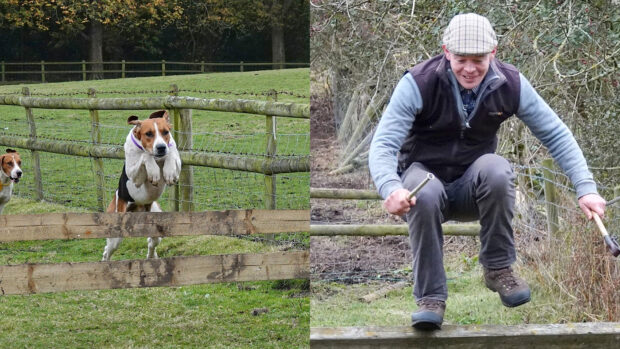Meeting the energy requirements of the hunter is not always easy. Towards the end of the season many people struggle to keep weight on their horses, while maintaining an even temperament.
Horses react to different energy sources in various ways therefore it is important to consider the type of energy you are feeding your horse.
There are three main sources of energy in most horses’ diets:
- Starch
- Fibre
- Oil
Starch
Starch is a carbohydrate and is the primary component of cereal grains such as oats, barley and maize. It is a versatile energy source and cereals commonly form a major part of the hunter’s diet.
However, the horse has evolved to eat mainly grass and as a result starch only forms a small part of their diet. Therefore the horse’s digestive system has not evolved to process large amounts of starch.
Starch is most successfully digested in the small intestine. However, when we feed a large starch-based meal (more than 2.5kg), especially if the animal has not had access to continuous forage, some of the starch will pass through the small intestine without being digested. Bacteria in the hindgut will then ferment the undigested starch, which can increase the risk of metabolic disorders such as acidosis, colic and laminitis.
Fibre
The horse is designed to obtain its energy from fibre. As a result fibre is essential to maintain a healthy gut and at least 50% of the horse’s diet should be made up of fibre sources such as grass, hay and/or haylage.
Fibre is digested in the hindgut by bacteria in a process can take up to 60 hours. This means that the energy produced is released into the body very slowly. Good quality highly-digestible fibre can contribute substantially to meeting a horse’s energy needs.
Oil
Oil is used extensively as a dietary energy source for horses. Like fibre, oil is a slow release energy source. Oil may contain as much as 35MJ/kg (nearly three times as much energy than in starches). As oil is so energy dense only small amounts need to be fed, between 100-400ml per day.
The right energy source
Generally, the diet of the hunter will incorporate all the energy sources discussed above. When choosing your feed one must consider the type of work your horse is doing. Hunting requires sustained work over a long period of time, so the majority of the dietary energy should come from slow release energy forms i.e. fibre and oil, which will not exacerbate any excitable behaviour.
A diet that has been specifically designed for the hunter should be high in both fibre and oil and contain good quality protein to aid muscle development. It must also provide all the essential vitamins and minerals.
If your hunter is typically a good doer a product that has been formulated to be low in starch, with the majority of the energy provided by fibre and oil will be ideal.
Hunters prone to weight loss throughout the hunting season may benefit from feeds that are high in slow releasing energy sources to help them gain condition in a controlled way and maintain a calm temperament. A feed that also contains a probiotic will aid fibre digestion and reduce the risk of digestive disturbances such as colic.
Electrolytes
Water is rarely thought of as food, but although it does not contain any calories, it is vital in maintaining life. It makes up about 50-75% of the total body mass and nearly all metabolic reactions occurring in the body depend on water.
Horses lose large amounts of electrolytes through sweating, and providing electrolyte supplementation can help the horse recover from hard work and regain their appetite quickly.
|
What to feed: The hunter
There are a number of products that can be incorporated into your hunter’s diet but each horse should be treated as an individual, so ask advice from your vet and a nutritionist. Dodson & Horrell products that are suitable for hunters include: Hunter Eventer Cubes, Staypower Cubes and Muesli, Build Up and Build Up Cubes, Alfalfa, Surelyte and B-Sure For further information and friendly feeding advice call the Dodson & Horrell Feed Helpline (tel: 0870 442 3322) Normal national call rates apply, or visit: www.dodsonandhorrell.com |


